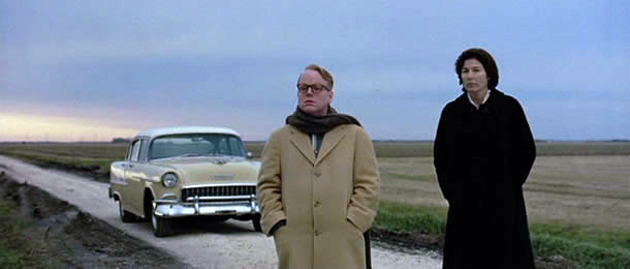Wise Rating 65%
Review Date: 2017
I remember seeing Capote (the man, not the movie of course) on TV several times growing up as a kid; he was a familiar figure of the time and quite an unusual character, enjoying the fame and attention of being a celebrity. “Capote” specifically covers the period in which Capote researched the 1959 massacre of a Kansas farm family by two drifters; the movie chronicles his emotional journey investigating the crime and then interviewing the murderers in prison. From that research, he produced the first nonfiction novel “In Cold Blood,” a riveting masterpiece. The book then led to the 1967 movie, also a masterpiece and probably the greatest true-crime film ever produced.
You don’t have to know anything about the actual murder or “In Cold Blood” to see “Capote.” But you probably wouldn’t be interested in seeing “Capote” unless you actually read “In Cold Blood” or saw the movie based on the book. I’ve done both, and both are great. “Capote,” however, is OK.
Philip Seymour Hoffman, a great actor who tragically died in 2014 at the age of 46, portrays Capote with amazing accuracy, capturing the soul as well as the mannerisms of that celebrity author. And the film displays Capote’s complexity, showing how he could have sympathy for killer Perry Smith while coldly exploiting the murder for the sake of writing his masterpiece.
Because both “Capote” and “In Cold Blood” cover the same timeline and many of the same events, comparison is inevitable. Both movies include the two murderers, Richard Hickcock and Perry Smith. But “Capote” just shows us what the murderers said, while “In Cold Blood” gets into their heads and hearts. “Capote” reveals the murders with the graphic detail you would expect to see in a movie today, while “In Cold Blood” also shows the murders but with the restraint you’d expect in 1967. And the 1967 version is so much more powerful. With “Capote,” you’re shocked by the blood; with “In Cold Blood,” you’re blown away by the murders.
Ultimately, “Capote” works like a dramatized documentary that you would find in the Special Features portion of a DVD or Blu-Ray. “Capote” gives additional information about the original events while providing some insight into the man who immortalized those events in his novel. But “Capote” just isn’t very transcendent; I mean, we get to know the guy, but so what? It doesn’t really reveal anything about ourselves, just about Capote; “In Cold Blood” goes beyond being about a couple of bad guys and ultimately becomes a journey into our own dark nature and our society.
For a real tribute to Capote’s genius, see “In Cold Blood.”
Not for Kids
Extra:
- It’s fun to see Harper Lee, the author of “To Kill a Mockingbird,” portrayed in “Capote” as well. Harper Lee was a close friend of Capote’s and accompanied him on his first trip to research the Kansas killings.
